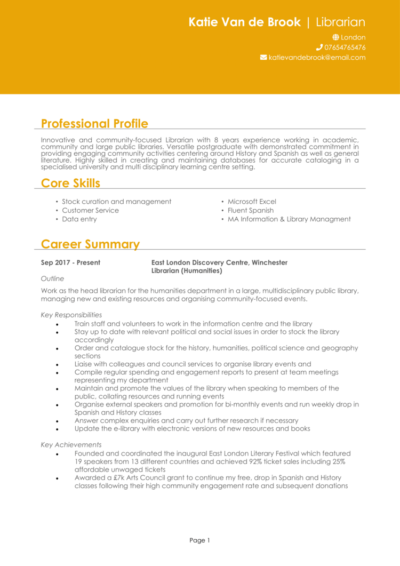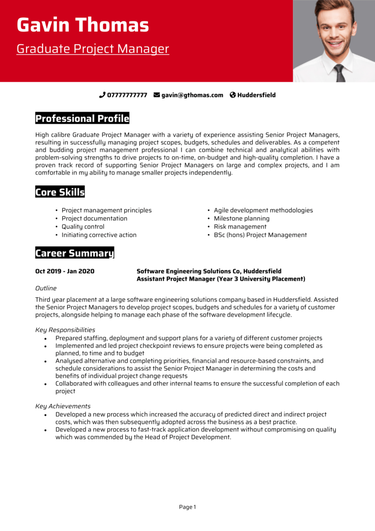You know the power of a well-organised system, whether it’s shelving books in the right order or cataloguing an entire library’s collection. But when it comes to your career, is your CV as neatly arranged as your bookshelves?
Before you can guide patrons to the right information, you need to guide a recruiter to the right conclusion – that you’re the perfect librarian for the job.
This guide includes a librarian CV example and expert advice to help you craft a compelling application that secures interviews.
Librarian CV
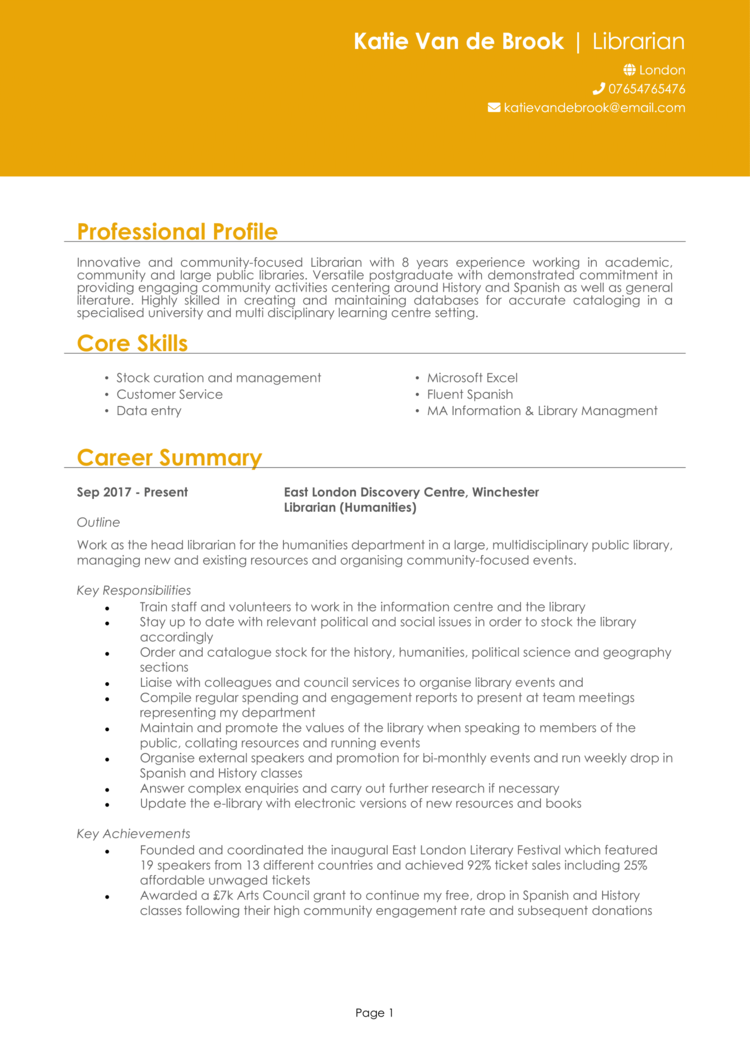
How to write your Librarian CV
Learn how to create your own interview-winning Librarian CV with this simple step-by-step guide.
A librarian’s CV should be as well-structured as a carefully curated archive. If it’s difficult to navigate or doesn’t clearly highlight your key qualifications, a hiring manager might move on before discovering the value you bring.
This guide walks you through each step, from structuring and writing a CV correctly to crafting content that showcases your expertise. Because let’s be honest – if you can organise thousands of books using the Dewey Decimal System, writing a well-structured CV should be a breeze.
Librarian CV structure
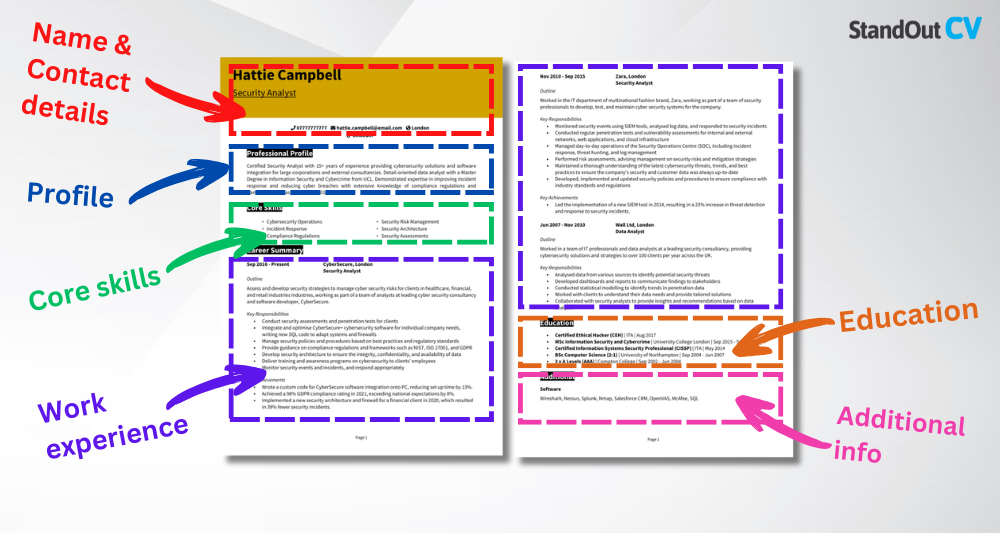
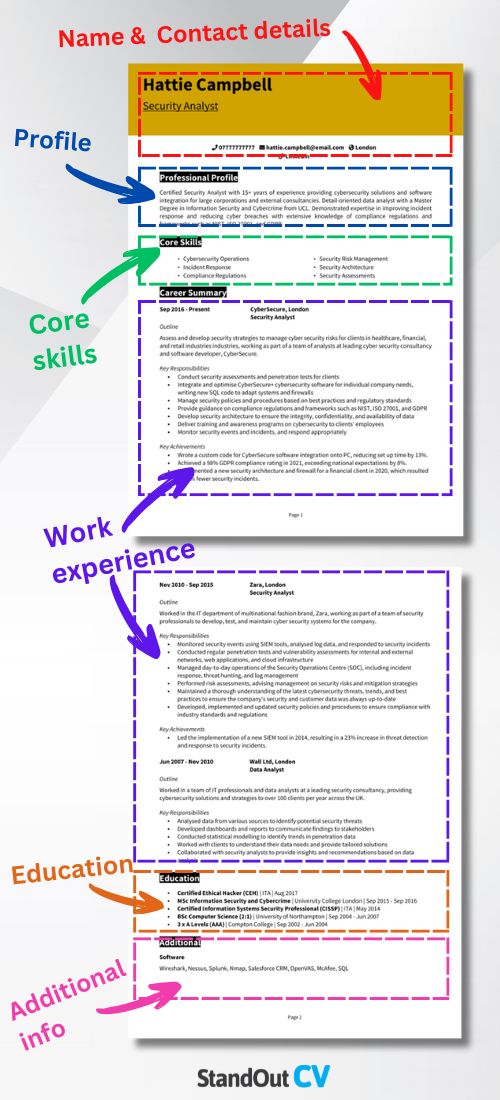
A librarian’s CV structure should be methodically arranged – just like the resources you manage. Hiring managers, like library visitors, need to find information quickly. If your CV is difficult to scan, key details could get lost, and your application might be overlooked.
Here’s the structure to follow:
- Name and contact details – Keep contact information at the top so employers can easily reach you, alongside a picture of yourself if you want.
- Profile – Open with a strong summary that highlights your expertise in library services, research, and information management.
- Core skills – Provide a concise list of your most relevant skills, such as cataloguing systems, database management, and user support.
- Work experience – Present your employment history in reverse chronological order, focusing on key responsibilities and achievements.
- Education – List your degrees and any library-related certifications in order from most recent to oldest.
- Additional info – You can optionally mention hobbies, additional languages, or relevant voluntary work and awards.
Librarian CV format
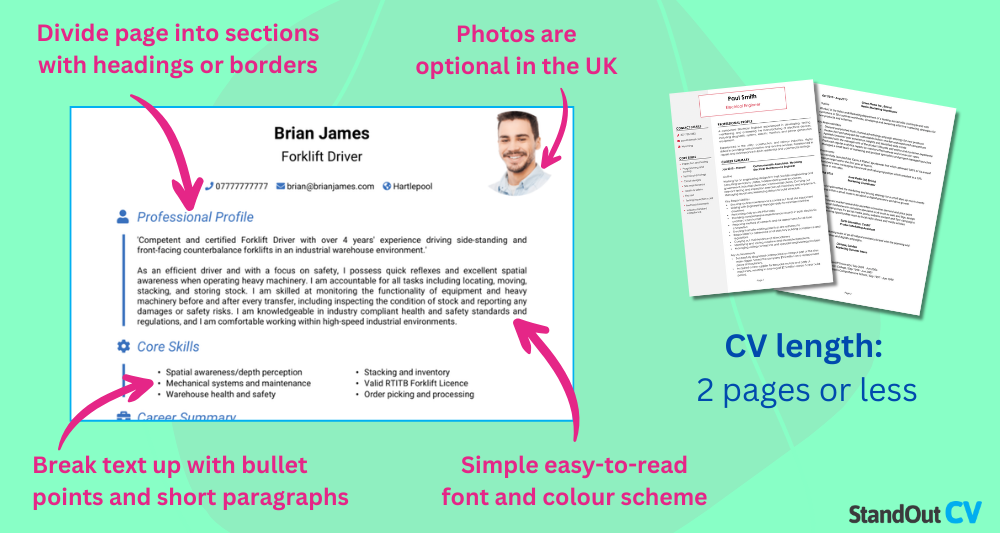
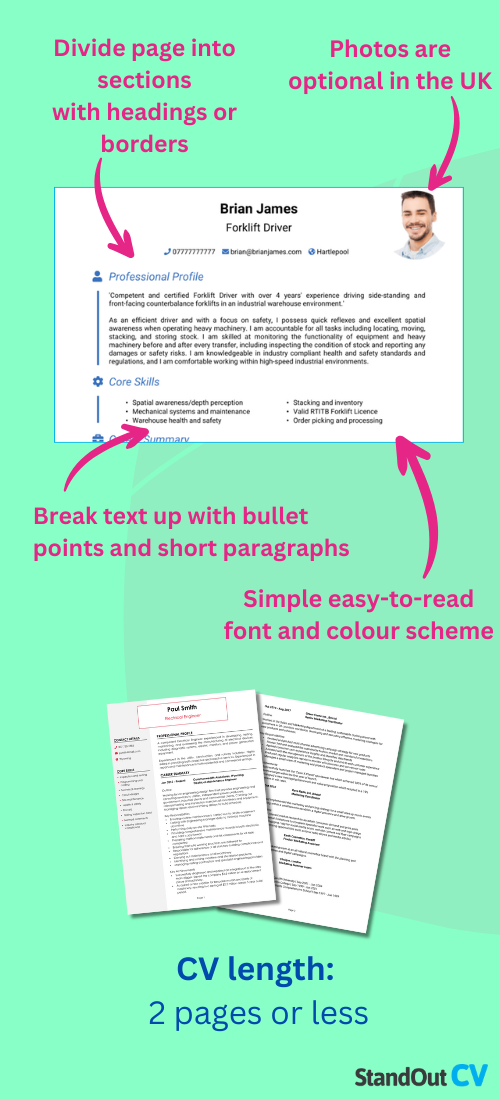
A well-formatted CV should reflect the organisation and attention to detail that defines a great librarian. If a recruiter has to work too hard to find key details, your application might get shelved indefinitely, so make sure your layout is clear.
Keep these formatting tips in mind:
- Bullet points – Break up long text with clear, skimmable bullet points.
- Divide sections – Structure your CV logically so each section is easy to navigate.
- Use a clear and readable font – Professionalism matters, so choose a simple, legible font.
- No more than 2 pages – Keep it the right length. If your CV is longer than War and Peace, it’s probably time for an edit.
What is a Librarian CV profile?

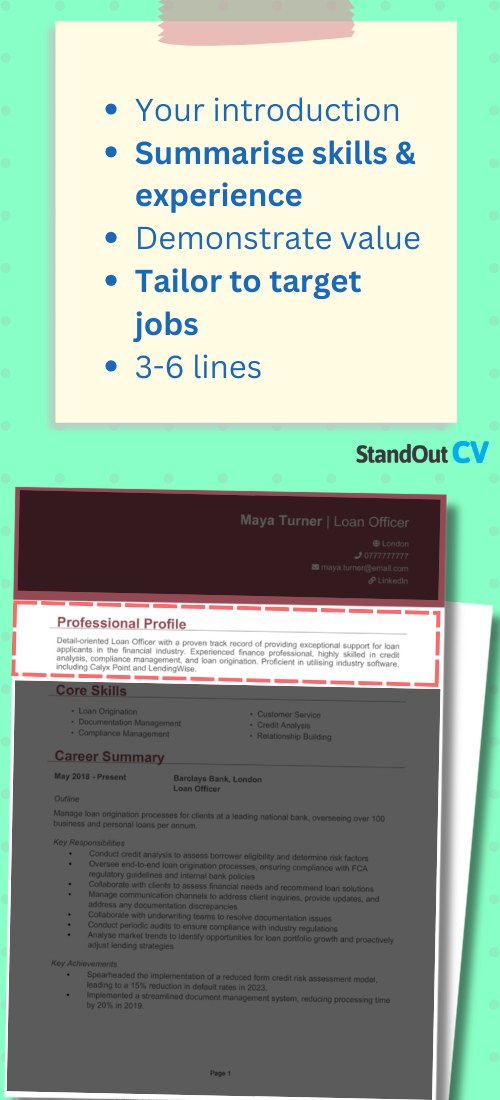
Your CV profile is like a book blurb – it should be concise, engaging, and make the reader want to know more. Just don’t leave them on a cliffhanger: this is your chance to quickly highlight your expertise and convince recruiters to keep reading.
Tailoring your profile to the job description is crucial. Think about the skills and experience the employer is looking for and make sure they feature prominently in this section.
Librarian CV profile examples
Profile 1
Organised Librarian with five years of experience managing public and academic library collections. Skilled in cataloguing, digital resource management, and assisting patrons with research inquiries. Proficient in library management systems such as Koha and SirsiDynix, with a passion for promoting literacy and lifelong learning through engaging programmes and community outreach.
Profile 2
Dedicated School Librarian with three years of experience supporting students and staff by curating educational resources and managing reading initiatives. Skilled in maintaining a diverse book collection, assisting with research projects, and fostering a welcoming library environment. Proficient in library software and digital cataloguing tools, ensuring seamless resource accessibility.
Profile 3
Experienced Academic Librarian with over eight years of expertise in information science, specialising in research support, digital archives, and open-access publishing. Skilled in metadata management, reference services, and instructional workshops for students and faculty. Proficient in MARC, Dublin Core, and institutional repository platforms to facilitate scholarly communication.
What to include in your Librarian CV profile
To create a strong professional profile, consider the following:
- Where you worked – Mention whether you’ve worked in public libraries, academic institutions, corporate libraries, or archives.
- Your top qualifications – If you have a degree in Library and Information Science or a CILIP-accredited qualification, highlight it in your CV here.
- Key library skills – Whether it’s cataloguing, research support, or digital archiving, emphasise your strongest abilities.
- User services and engagement – Libraries are about more than books; highlight your experience in supporting patrons, delivering workshops, or community outreach.
- Technical expertise – If you’re skilled in library management software, digital databases, or archival systems, make sure to mention them.
What to include in a Librarian CV skills section
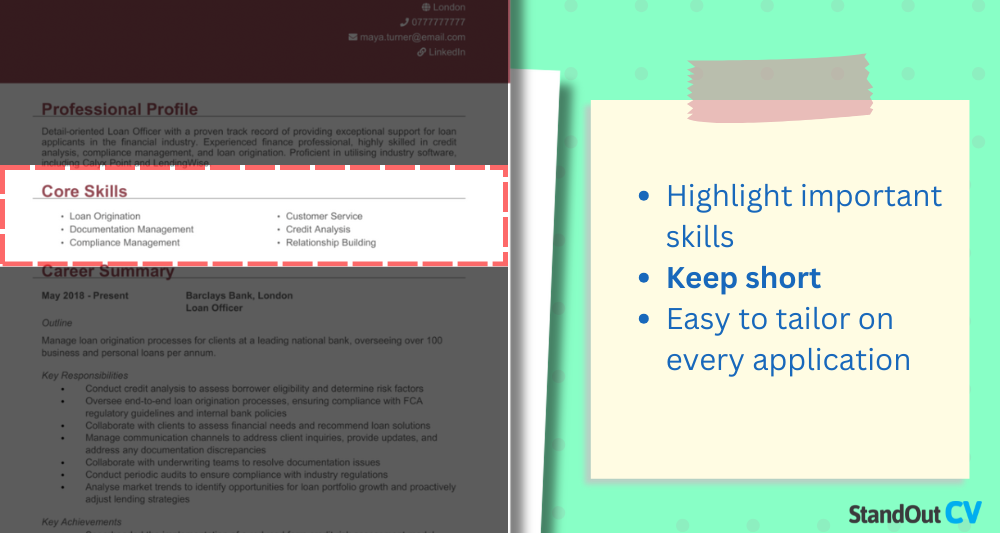
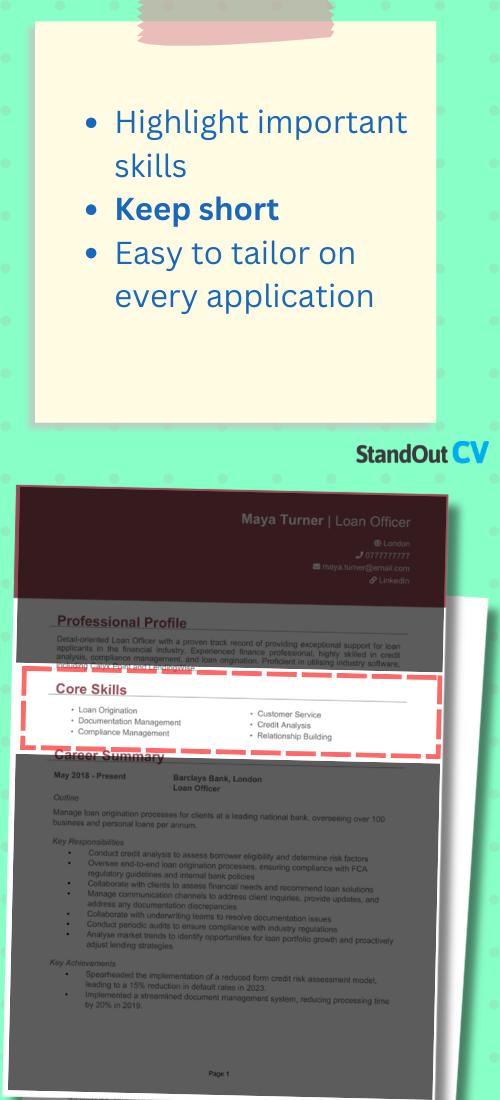
A core CV skills section provides a quick way to showcase your key strengths at a glance. Think of your core skills section as a subject index – it helps recruiters locate the key details without flipping through every page of your CV.
Don’t make the mistake of sending the same CV off to every job. Customise this section to the job description, ensuring the listed skills align with the role you’re applying for.
Show off the core skills recruiters look for
- Collection Management – Organising, cataloguing, and maintaining books, digital resources, and archival materials.
- Cataloguing and Classification – Using systems like Dewey Decimal, Library of Congress, or MARC to index and organise materials.
- Reference and Research Assistance – Helping patrons locate information using databases, archives, and specialised resources.
- Library Database Management – Managing Integrated Library Systems (ILS) like Koha, Alma, or Sierra for efficient resource tracking.
- Digital Resource Management – Curating and maintaining e-books, online journals, and databases for remote access.
- Information Literacy Training – Teaching users how to effectively search, evaluate, and use information sources.
- Archiving and Preservation – Implementing strategies to conserve historical documents and fragile materials.
- Library Programming – Planning and executing educational workshops, reading programs, and community events.
- Copyright and Licensing Compliance – Ensuring library materials comply with intellectual property laws and licensing agreements.
- User Experience Optimisation – Enhancing library services and spaces to improve accessibility and patron engagement.
Work experience
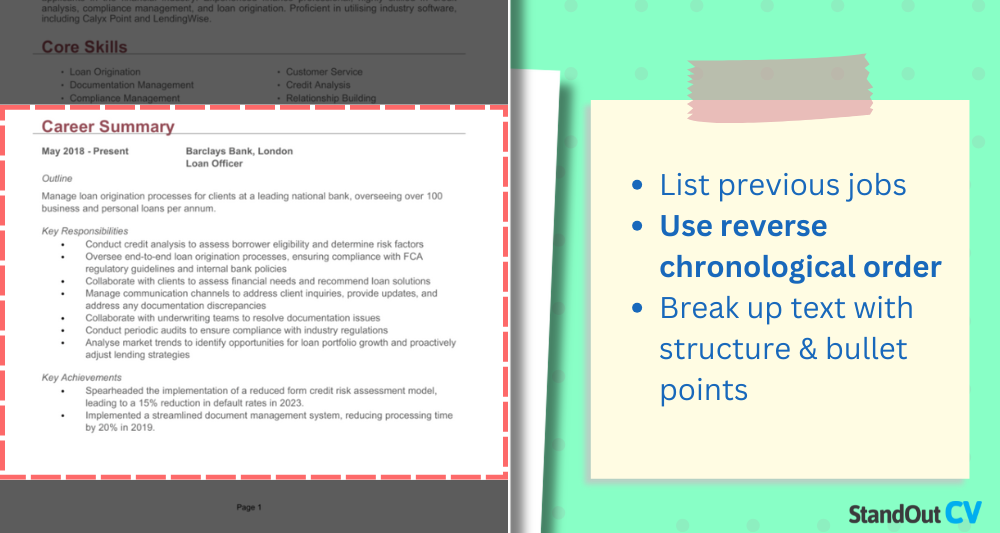
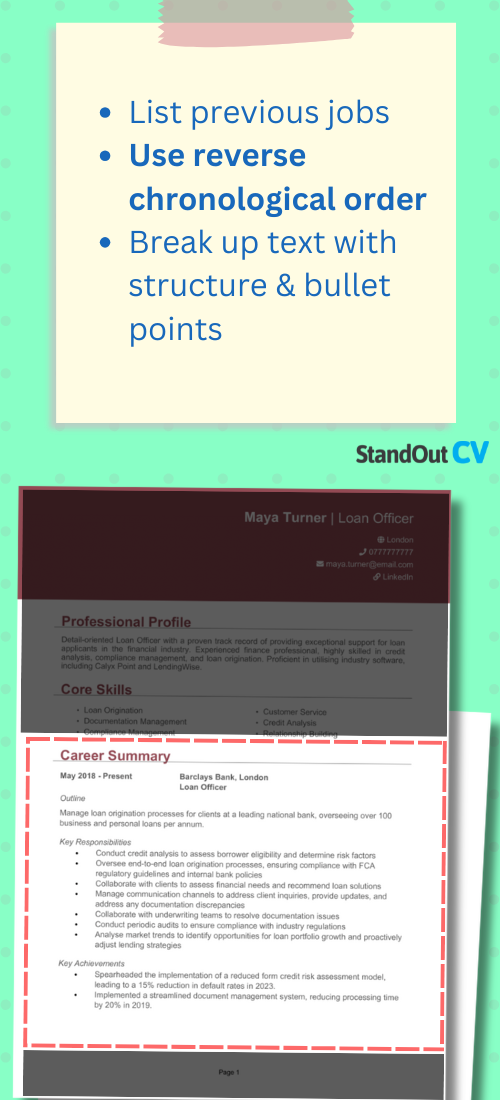
Your work experience is the most important chapter of your CV. A hiring manager wants to know what you’ve actually done. While listing skills is useful, recruiters are most interested in seeing how you’ve applied them in real-world library environments.
List your roles in reverse chronological order, starting with the most recent. If you don’t have extensive professional experience, highlight relevant internships, volunteer work, or academic projects that demonstrate your library and research skills.
Structuring your jobs
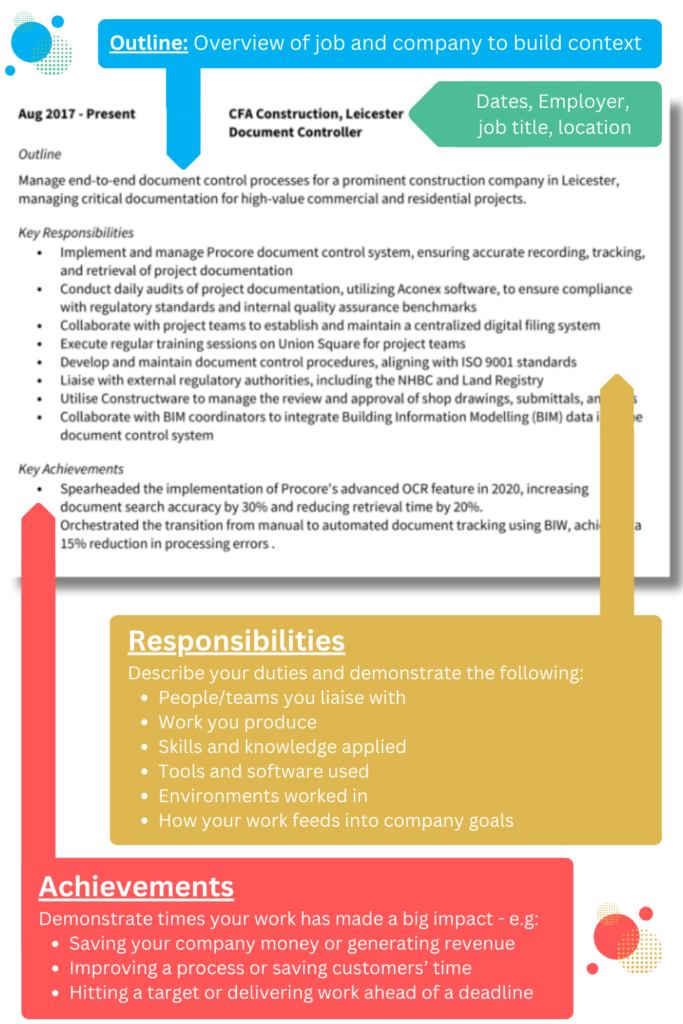
- Outline – Describe the type of library or organisation you worked in and how your role fit within the team. Mention who you reported to and any specialist areas you focused on.
- Responsibilities – List your key duties, such as managing collections, assisting with research inquiries, or implementing digital cataloguing systems. Use action words like “curated”, “managed”, and “developed” to bring your experience to life.
- Achievements – Did you increase membership numbers? Improve research access? Implement a new database system? Prove your impact with numbers – just like library fines, they add up.
Example jobs for Librarian
Public Librarian | Central City Library
Outline
Managed a diverse collection of books and digital resources while supporting the local community through literacy programmes and research assistance.
Responsibilities
- Catalogued and maintained library materials using Koha, ensuring efficient resource retrieval.
- Assisted patrons with research inquiries, technology usage, and reference materials.
- Organised community events, including book clubs, storytelling sessions, and author talks.
- Implemented digital lending systems to improve accessibility for remote users.
- Managed library budgets and acquisitions, selecting books and resources aligned with community interests.
Achievements
- Increased library membership by 20 percent through community engagement initiatives.
- Expanded digital resource availability by 30 percent through partnerships with online databases.
- Recognised for developing an inclusive reading programme that improved literacy among young readers.
School Librarian | Greenwood Academy
Outline
Curated and maintained an engaging school library collection, supporting students in developing research skills and a love for reading.
Responsibilities
- Managed a collection of 10,000+ books, ensuring up-to-date and relevant resources for students.
- Taught library skills workshops, guiding students on research techniques and digital literacy.
- Developed a reading programme that encouraged students to explore diverse literature.
- Assisted teachers in sourcing educational materials for lesson planning.
- Maintained digital cataloguing systems and monitored book circulation.
Achievements
- Increased student library engagement by 40 percent through reading incentive programmes.
- Reduced book loss by 25 percent by implementing a streamlined tracking system.
- Recognised for improving research skill development through structured workshops.
Librarian | Sheffield University Research Library
Outline
Provided research support to students and faculty, managing digital archives and ensuring access to scholarly materials.
Responsibilities
- Developed and maintained digital repositories for academic publications and research materials.
- Delivered research consultations and workshops on information literacy and database usage.
- Managed interlibrary loan requests, ensuring students and staff had access to global resources.
- Supervised metadata creation and cataloguing to enhance digital accessibility.
- Collaborated with faculty to integrate library resources into course curricula.
Achievements
- Improved research efficiency by 35 percent by implementing a new database indexing system.
- Increased access to open-access publications by 50 percent through institutional partnerships.
- Recognised for delivering highly rated instructional sessions on academic research methods.
How to write your education section
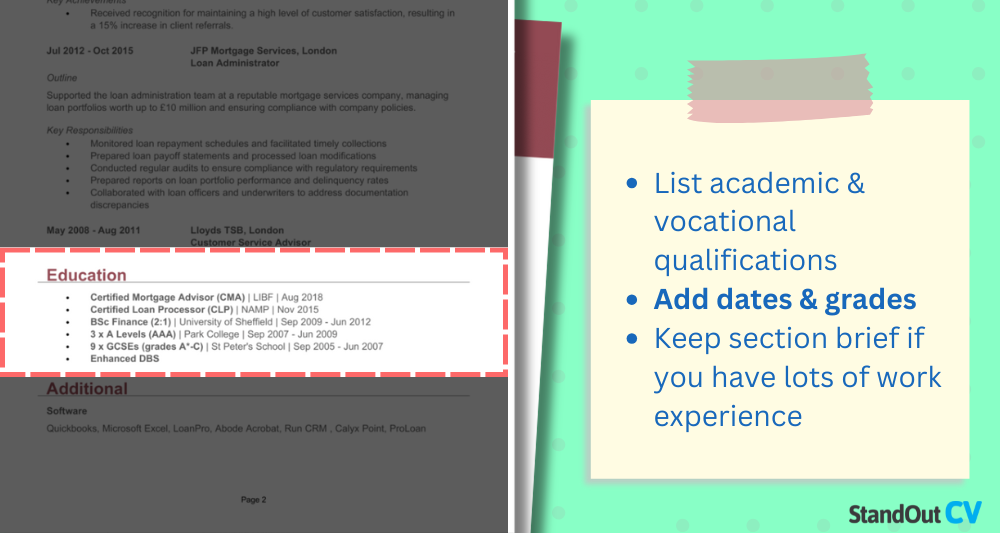
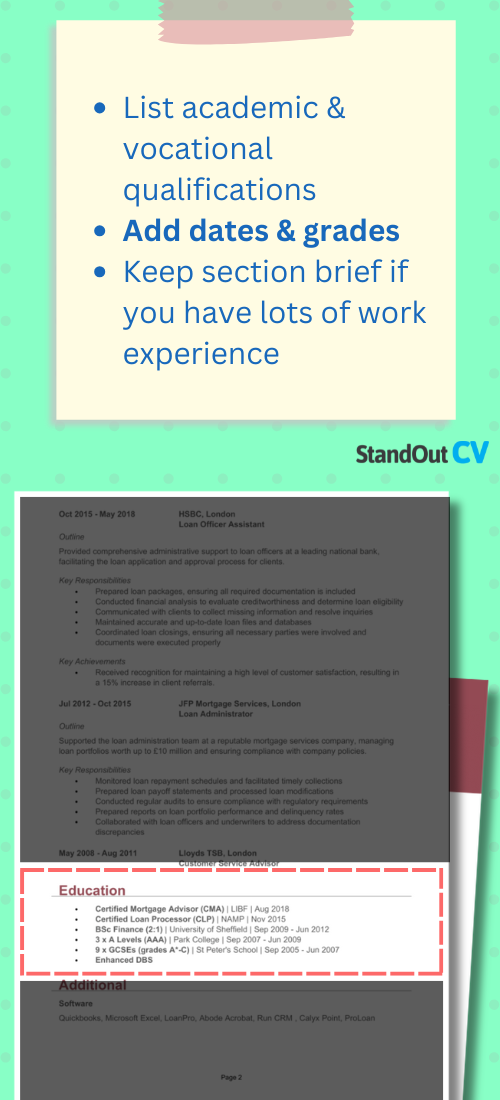
The education section should list your most relevant qualifications, such as degrees, diplomas, and professional certifications. Since recruiters prioritise experience, this section should be brief unless you’re a recent graduate.
If you’re early in your career, you can highlight relevant coursework, dissertation topics, or research projects that showcase your library and information skills.
List qualifications in reverse chronological order, starting with the most recent.
Best qualifications for Librarians
- Master’s Degree in Library and Information Science (LIS) – A widely recognised qualification for professional librarian roles.
- CILIP-accredited Postgraduate Diploma in Library and Information Studies – An industry-standard qualification endorsed by the UK’s Chartered Institute of Library and Information Professionals.
- Level 3 Certificate in Libraries, Archives and Information Services – A valuable qualification for those starting a career in library services.
- Digital Archiving and Records Management Certification – Demonstrates expertise in managing digital collections and archives.
- Teaching and Information Literacy Qualification – Useful for academic librarians or those providing research and learning support.


